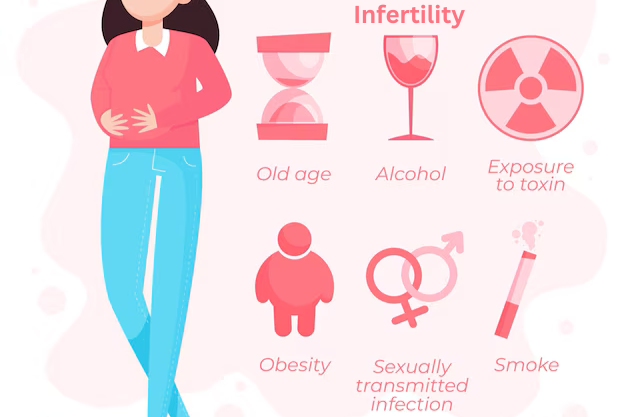Why is Infertility so common Today?
Infertility is a growing global health problem, affecting millions of couples worldwide. The causes of infertility are complex and multifaceted, but there are several factors that have contributed to its increasing prevalence in recent years.
1. Delayed Childbearing
One of the most significant factors contributing to infertility today is the delay in childbearing. Women are increasingly choosing to delay having children for various reasons, including education, career advancement, and personal goals. However, as women age, their fertility naturally declines. This is because the quality and quantity of eggs decrease over time.
2. Lifestyle Factors
Lifestyle factors play a significant role in infertility. Obesity, smoking, excessive alcohol consumption, and drug use can all negatively impact fertility. Obesity, in particular, can disrupt hormonal balance and lead to insulin resistance, which can affect ovulation. Smoking and excessive alcohol consumption can damage both sperm and eggs.
3. Environmental Factors
Exposure to environmental toxins can also contribute to infertility. Pesticides, heavy metals, and other pollutants can damage the reproductive system. Additionally, exposure to electromagnetic radiation from cell phones and computers may also affect fertility.
4. Medical Conditions
Certain medical conditions can also cause infertility. These include:
- Endometriosis: A condition where uterine tissue grows outside of the uterus.
- Polycystic ovary syndrome (PCOS): A hormonal disorder that can cause irregular periods and infertility.
- Uterine fibroids: Non-cancerous growths in the uterus that can interfere with fertility.
- Sexually transmitted infections (STIs): Untreated STIs can lead to pelvic inflammatory disease (PID), which can damage the fallopian tubes and cause infertility.
- Genetic factors: In some cases, infertility can be caused by genetic abnormalities.
5. Stress
Chronic stress can also affect fertility. High levels of stress can disrupt hormonal balance and interfere with ovulation. Additionally, stress can reduce libido and make it difficult to conceive.
6. Assisted Reproductive Technologies (ARTs)
The widespread use of assisted reproductive technologies (ARTs), such as in vitro fertilization (IVF), has led to a more accurate diagnosis of infertility. As a result, more couples are being diagnosed with infertility than ever before.
Infertility Treatment at New World Fertility Centre
If you are struggling with infertility, New World Fertility Centre in Delhi can help. Our team of experienced fertility specialists offers a wide range of treatments, including:
- IVF(in vitro fertilization)
- Intrauterine insemination (IUI)
- Donor egg and sperm programs
- Preimplantation genetic testing (PGT)
We are committed to providing personalized care to each of our patients and helping them achieve their dream of having a baby.
Conclusion
Infertility is a complex issue with multiple contributing factors. By understanding the causes of infertility and seeking appropriate treatment, couples can improve their chances of conceiving.
If you are concerned about infertility, we encourage you to schedule a consultation with one of our fertility specialists. We can discuss your individual needs and help you develop a personalized treatment plan.
Contact New World Fertility Centre, Delhi
Phone: [+91-844-8786-106]
Website: [https://newworldfertility.com]
Frequently Asked Questions(FAQs)
1. What is the most common cause of infertility today?
There is no single cause of infertility. However, factors such as delayed parenthood, lifestyle choices (e.g., poor diet, smoking, and excessive alcohol consumption), and medical conditions like PCOS and endometriosis are among the most common causes. Environmental toxins and stress also play significant roles in both male and female infertility.
2. How does age affect fertility?
Fertility declines with age, particularly in women. Women are born with a finite number of eggs, and both the quality and quantity of these eggs decrease as they age. After the age of 35, this decline accelerates, making it more difficult to conceive. Men also experience a gradual reduction in sperm quality and quantity with age, though the decline is slower compared to women.
3. Can stress really cause infertility?
Yes, chronic stress can disrupt hormonal balance, leading to issues with ovulation in women and reduced sperm quality in men. Stress can also negatively affect overall sexual health and well-being, making it more challenging to conceive.
4. What lifestyle changes can improve fertility?
Adopting a healthy lifestyle can improve fertility. Some key recommendations include:
- Maintaining a healthy weight through balanced nutrition and regular exercise
- Avoiding smoking, excessive alcohol consumption, and drug use
- Managing stress through relaxation techniques such as meditation or yoga
- Reducing exposure to environmental toxins and harmful chemicals
5. How do environmental factors affect fertility?
Environmental pollutants such as pesticides, plastics, and heavy metals can interfere with hormone regulation, which plays a vital role in reproductive health. Long-term exposure to these chemicals can lower fertility in both men and women by damaging reproductive cells and organs.

 Aug-23-2025
Aug-23-2025